1975.
While that number might mean different things to you, like your birthday, an anniversary, graduation year, part of a lottery number ? to me it represents a quota.
Several years ago, a fan counted up all the articles I wrote every year and came up with an estimate of 1,975 articles published annually across multiple sites.
I was stunned. No, staggered. I now had a number. I didn?t know what to do with it. It freaked me out. That?s 164 articles a month. Thirty-eight articles a week. Five and a half a day. That?s a lot.
Don?t even ask to add up the word count. I couldn?t. Yet, the same person estimated that I wrote 2,370,000 words annually.
It took a long time for me to come to grips with that number. I worried when I became smarter with my time and dropped some of the online columns and magazines to concentrate on more influential sites. What if I couldn?t keep up with the numbers?
After a while I gave up and realized it was just a number. Like a random phone number or birth date. Another number not to worry about. Much.
Along the way to generating all those words every year for many years on end, I learned a few things worth sharing.
?Words may not do it alone, but a picture is NOT worth a thousands words when fed through feeds and search engines. You must have the words.?
I?m often consulted by businesses about their SEO, their search engine optimization and ranking within search results (SERP). The key is to use words, real words, to be adequately evaluated by search engines in their secret sauce for ranking.
You don?t have the words, you won?t rank.
It?s that simple.
Use your words.
?Visualize a person or small group and write as if you are talking directly to them. If that?s too formal or uncomfortable, imagine you are writing to a friend.?
When working on my first website, I realized that I couldn?t write to the masses. I had to write to someone, a specific someone. This way, my words had meaning and emphasis behind them. I chose one of my best friends, Susan. I would visualize her reading this, laughing at the funny parts, groaning at the not so funny parts, and leaning forward with questions as she got to the technical parts.
I knew I had to answer her questions in my writing. She became my audience, the representative of everyone reading that site.
As my site grew, more numbers came my way. First there were ten steady readers. Okay, I can talk to ten people. Then it became 100. Can I talk to 100 people. Maybe. Then it was 1,000, 2,000, 10,000, 20,000 ? I can?t talk to 20,000 people! Can you?
Think about the person you are writing for. The one person you have in mind as a friend, customer, family member. Do you know them? What do they look like? What do they like? What thrills them? What disappoints them? What do they need? And what do they need to know from you.
Write what they need to know.
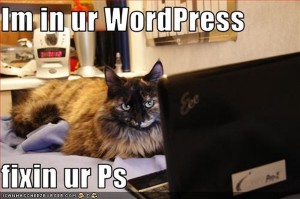
Respect your audience.
Respect copyright.
Respect trademarks.
Originality will always win
?Original content will always win over redundant, blockquoting, and echo chamber content. Even if you can?t write well, the attempt to say it in your words is always appreciated and welcome.?
There is a capital P in the middle of WordPress. Many in the WordPress community lose respect for those writing brilliant things about WordPress and not using the proper upper case on that middle P. It sends clear messages to those who know WordPress. It says the writer doesn?t respect the WordPress trademark. It says they don?t pay attention to details. People notice the smallest details.
Respect trademarks, but also respect your audience.
For over ten years I?ve asked my audiences how they know a site or blogger is trustworthy. While they can come up with many visual factors such as too many adds verses too little content, they admit that they just instinctively know. It?s a gut response. People pay attention to the smallest detail, and the smallest detail can tell them not to trust you.
Respect your audience. Treat them like the intelligent adults the majority of them are. Don?t talk down to them, over them, or even at them. Talk with them. Be inclusive. Share.
It is normal to quote and requote and share on the social web. If we like something, we want to share it with everyone we know.
However, if it isn?t yours, don?t imply that it is. Give credit where credit is due and honor the originator of original content, as you wish they would yours.
?Share with us your thoughts, feelings, experiences, and knowledge. Teach us, oh, great blogger, how to live and function in this crazy world.?
Share your thoughts and ideas, your expertise, all your wisdom with your readers. They are there to learn from you. Teach them well.
In my workshops, I often hear ?I don?t have anything interesting to say.? That?s not true. Look deeper.
What was your childhood like? I grew up picking berries in the summer for extra money, getting freckled and sunburned in the early summer heat of the Pacific Northwest. Did you grow up gardening or working in an orchard or farm? Do you even know what it is like to grow your own food? I often traveled by horseback long before I had a bicycle. Did you? That way of life is mostly gone. If you remember such a childhood, you have something to teach others who will never know that kind of experience.
Did you have an interesting job? Did you travel and find adventure around the world? Or did you stay home and watch your community change around you?
Did you have interesting family or a partner or spouse? Did you break rules or obey them?
Everyone has a story to tell and share with others. By sharing, you teach.
?Use nouns and synonyms to help the reader know what you are writing about and increase the keywords in your content.?
It?s fantastic. Everyone should use it. I use it. I love it. I couldn?t live without it. It?s such an important part of my life, I would be lost without it. You need it, too.
What am I talking about? WordPress? Love? Water? My car?
We are taught in school to use the primary noun at the beginning of a page or paragraph and then refer to it as a pronoun from that point forward. Search engines don?t work that way. They need the words and the proper names of the words.
WordPress is fantastic. Everyone should use WordPress. I use WordPress. I love WordPress. I couldn?t live without WordPress. WordPress is such an important part of my life, I would be lost without it. You need WordPress, too.
It seems excessive when you read it slowly, but if your eye is scanning fast down a web page looking for the words to ring the bell and tell you that you?ve found the answer you?ve been looking for ? using a lot of words helps the reader know they found the answer.
?Learn how to write keyword-rich content to increase your page ranking. More importantly, write with keywords to help your reader know exactly what you are writing about.?
Just as you need to use nouns not pronouns, you need to use all the words that describe what you are writing about.
That scanning process, skimming the page to find the answer, is a critical part of our web experience. Using the words people look for, all the synonyms and related phrases, helps them not only find what the are looking for, but it helps search engines help them find the words.
There is no greater joy in my blogging world than to get a comment from someone saying thank you for having the answer they needed so desperately. My words helped them find my page and get the answers they needed.
?If you make your readers think, you?ve succeeded in interacting with them. If you make them write, you?ve succeeded twice over.?
Many years ago, I received one of the first Thinking Blogger Awards. I was so humbled, I wrote Are You a Thinking Blogger? to explain why I should not have received the award as I felt I lacked the right qualifications.
That?s what I?m looking for in a thinking blogger. Someone totally committed to their belief. It?s more than that, too.
It?s passion.
It?s that fire in your belly, morally committed passion that leaps off the blog page.
You know it from the moment you land on the blog and read the first sentence. You know this person knows what they are talking about, how to talk about it, and that this is place to find the information you want. You know you?ve come to the right place.
There is no doubt. You know in an instant that this is someone who knows what they are blogging about.
That?s a thinking blogger.
 They honored me with the first ever Platinum Thinking Blogger Award for making them rethink their own award.
They honored me with the first ever Platinum Thinking Blogger Award for making them rethink their own award.
I believe that a good blogger is one that publishes content worth reading. I believe a great blogger publishes content worth linking to, worth spreading around the social web, worth discussing over the water cooler.
?The fresh perspective will help you edit and improve the content. You might find new life in your old posts and direct more traffic their way.?
In my classes and workshops I ask participants where they think on their site most people enter and visit. They usually answer the front page or their most popular post.
The correct answer is ?any post.?
Any post can be a gateway to your site. If it pops up in a person?s search results and has the right answer, it?s the perfect post for them.
Clean up all your old posts once in a while. Well, most of them.
Start with your most popular posts and make sure they say what you want them to say, and say it well. Stumble across a post that needs a little spring cleaning, clean that one up, too.
?A great idea does not translate automatically into good writing. It?s the editing that clarifies your writing so the idea comes through. It?s as much about the words you add as the words you take away to increase the post?s clarity and power.?
Many years ago, I was asked to write an article for a popular photography magazine on five photographers photographing and leading photo tours in Africa. The article was almost done when the email came in from the editor that made me scream in agony so loud, my husband could hear me through the entire house to the backyard. He came running.
?Are you okay? What happened??
?The article!?
?The article??
?The editor gave me the word count.?
My husband waited patiently as I gathered up the courage to put the number out into the air.
?2000 words.?
You should have heard his strangled scream.
Do the math. 2000 divided by 5. That?s 400 words each. Barely enough to squeeze in the types of cameras and names of the places they visit. No room for tips, techniques, recommendations to future travelers, nothing.
We went into panic mode and started editing like mad, words flying off the computer?s virtual paper. Three days later, 5,000 words down to 3,000, my husband had this revelation.
?When I was in college, I used to think how hard it would be to be a professional writer. Given a 1000 word paper to write in college, I thought, ?How do they come up with all those words?? Now I know that it?s easy to come up with the words. It?s harder to get rid of the words.?
Editing is about removing the words, about sifting through the words to find the ones that best convey their message.
Blogging is writing, never forget that. Edit, edit, edit. Great blog posts don?t just happen. They are edited.
?If they don?t get it, they won?t click it. If they do click, and the content doesn?t match, they won?t be back.?
Make your titles count. Make your titles encourage clicks. They are usually the first thing someone sees when they search, so make a good first impression.
I had a popular article published many times called ?The Business of Nature Photography.? I was bored with the title and wanted something snappier for the much-visited article. My mother came up with ?Making $$ Doing What Comes Naturally.? I liked the originality. In three months, the stats for that page dropped by 75%. Ouch. A few months later, pageviews were down to single digits daily. I changed the name to ?How to Succeed in the Business of Nature Photography? and three months later the article was back at the top.
It doesn?t pay to get clever with your post titles. Trust me.
Titles that don?t match the content, often used to catch someone?s attention rather than deliver quality content, makes people angry. Trust me, they won?t be back, and they are likely to warn their friends.
?You have less than a second to capture your reader?s attention. If the user on your site, feed, or search engine summary doesn?t ?get the point? in the first two or three sentences, you?ve lost them.?
Just as you need words to get the attention of search engines, thus visitors, you have less than 200 words to grab their attention and keep it.
Those first few words are also highlighted in search results, so they had better make a good impression to encourage a click.
?Don?t waste words. Don?t tell your readers things they really don?t want to know. Get to the point and stop wasting your time and theirs.?
?I still have to take a shower, and I?m late for work, but I wanted to tell you about this because I think it?s important, so I?ll just rush this off before I jump in the shower and head to work.?
This is quoted directly from a blog post about something of value to me, but I had to bite my lip in agony until I got through the opening paragraph to the meat of the subject.
The shower, late for work, excuses ? the useless words had absolutely nothing to do with what they were writing about. She was writing about a WordPress technique I was eager to learn about ? if I didn?t know the writer, I would have abandoned the page immediately.
Watch the wasteful words you use, the excuses, and the back story we don?t need to know. Get to the point.
?As a guide, write on three points, all related, and publish that. Want to write about 40 different unrelated topics? Don?t stuff them all into one post. Publish one for each topic.?
I heard this from a childhood mentor. ?If you are interested in 100 things, you are interested in nothing.? She was right.
We want to know you are the expert in your subject, and we want that information delivered in digestible chunks.
My general rule of blogging thumb is one point per paragraph, no more than three main points per blog post. Moving onto a new subject, write a new post.
?When readers follow along with the process, they better understand how it works and why it works for themselves.?
What works is the same technique that holds true for public speakers as well as technical writers and bloggers.
Tell them what you are going to tell them. Tell them. Then tell them what you told them.
I?ve tried all the other techniques. Trust me, it works. Use it.
?Web writing is very different from traditional writing. Learn the difference and you will have happier readers.?
Blog paragraphs are short. Traditional writing can have paragraphs that go on across multiple pages.
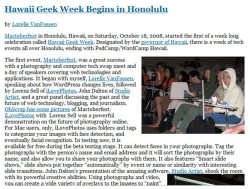
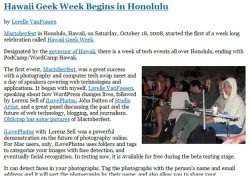
?Move the reader through the story. Make each sentence lead the reader to the next sentence, and each paragraph draws them into the next. They want to turn the page and consume the words as they read along. Make them want to scroll down for more.?
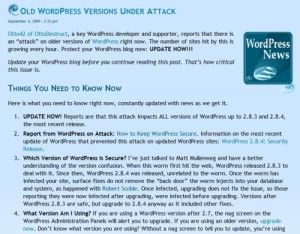 How long is too long for a blog post? Asking my classes, they often answer with interesting word counts: 200, 300, 400 words.
How long is too long for a blog post? Asking my classes, they often answer with interesting word counts: 200, 300, 400 words.
The only study I found early in the blogging industry years found that people will read to the end of a blog post no matter the length if it was interesting enough to finish reading.
Someone came up with the 400 word limit and it spread, but it is anecdotal. If you can find actual research, please let me know.
Until then, write your blog posts in an length appropriate to your audience needs, and in a way that makes them want to keep reading to the very end.
Use headings, those bold subtitles created with HTML tags such as <h1>, <h2>, <h3>, etc., to divide up the content by sections and pull the eye visually through the page.
?Writing in HTML, I blog faster, more efficiently, and I control how my words look and are presented on the page.?
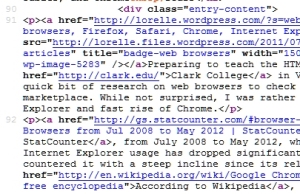 If you talk to power bloggers, the ones that have endured and have the income to brag about, you will find that the majority of them skip the visual, WYSIWYMG editor and go straight to writing in HTML.
If you talk to power bloggers, the ones that have endured and have the income to brag about, you will find that the majority of them skip the visual, WYSIWYMG editor and go straight to writing in HTML.
When you write in HTML, you write faster. No more wasting time moving your hand away from the keyboard to the mouse and hunting for the buttons. Your fingers do all the work, focused on the keyboard, leaving it only to add images.
Before you freak out, learning HTML is just like learning enough words to get you through your next vacation. There are 10 HTML tags you need to know to blog, of which five you will use on a regular basis.
If you can learn to say hello, goodbye, how much is this, where is the bathroom, and taxi, you can learn the minimal HTML required to blog.
?Lists are great ways of conveying a lot of information in digestible chunks.?
To get to the store, go down the driveway and turn right, then go until you see the white mailbox, the big one, and turn left. Go another mile and turn right on Orange Street. Go two blocks and turn at the Hazelnut Tree ? it?s the only one on the block ? and the post office will be on the right.
Hard to read and remember. Try this.
To get to the store:
- At the end of the driveway, turn right.
- At the large white mailbox, turn left.
- Travel one mile and turn right on Orange Street.
- Go two blocks and turn left.
- Go two blocks. You will see a large Hazelnut tree.
- The post office is on the right.
We are orderly people. We tend to like a lot of information in lists.
We like ordered lists for directions. We like bullets to breakdown the information.
It?s faster to read, easier to absorb, and looks cleaner on the web page.
?Don?t assume we know what you are talking about.?
If your readers are strictly in your industry, then they will easily recognize all the jargon and acronyms you toss out here and there in your content.
If your readers are the general public, let us in on the secret code.
I often forget that people don?t understand all the jargon associated with WordPress. I write about it so much, it is easy to take shortcuts and use WordPress terminology to explain how things work. Within a few minutes of publishing such a post, the first comments usually ask to clarify what I was talking about. I have to dig back into the article and add explanations to the terminology so everyone knows what I?m talking about.
It?s easy to get comfortable with industry-speak. Watch yourself and make sure that everyone understands what you are writing about.
?Your writing should give the illusion you are speaking directly to the reader without including all of the stutters, ?ums?, and ?likes? we hear in every day conversation. Don?t write like you have a dictionary or thesaurus sitting next to you. Match the writing style with the content.?
The first rule of writing is to write what you know. The second is to write like how you speak.
I don?t agree. Here is a real comment example from my article, ?Blog Writing: I lk yr blg.?
hello ive done most of it but doesnt wrk with me, ive gt a decent content on ma blog? what do u suggest?
You know, I kinda like like your blog and I think that you, like, should, like, blog more, like, right. BTW, kinda cool that you, like, have a blog, you know, like how.
Seriously, if you speak that way, don?t you dare blog that way.
However, if you are blogging for an audience that speaks like that, blog that way. Blog for your audience and speak their language.
For the rest of us, um, keep, um, your stutters, um, and, you know, pauses, like that, you know, kinda sorta to the safety of your, um, home and office, like.
?No Wishy-Washy Passive Voice. When people are searching, they like to be told what to do. Tell them.?
Passive voice is writing with words that lack authority or offer doubt or insincerity. Have, have been, kind of, maybe, might, could of, should of, all the words we use when we aren?t sure what we are talking about.
Speak with authority. It?s your blog. Own it.
?Don?t leave your reader wondering why she is on this page. Make your point early. Make your point obvious. Back it up with the details.?
We have a friend who starts speaking in the middle of a paragraph rather than at the beginning. While starting in the middle can be exciting, it usually leaves us totally ignorant of what he is talking about until he is almost done and we get the words that make all the puzzle pieces fall into place.
?Oh, you are talking about your boat. I thought you were talking about your dog!?
?What??
He can?t figure out what?s wrong with us that we can?t read his mind and figure out what he is talking about.
We all have these people in our lives. Don?t blog like them. Don?t assume the reader can read your mind.
When you write, ?As I was saying yesterday,? make sure that ?yesterday? is in a link to the post you just referenced so we can click back and catch up with the story.
Use intra-site links every time you can to help the reader follow your track and learn more about what you are writing about.
?Wild accusations, suggestions, and analogies do not build trust and respect. Make your opinions be based upon valid facts and identifiable references and citations. Be prepared to back your word up with the truth.?
As I explained in ?If You Can?t Say Anything Nice, Come Blog By Me? on the The Blog Herald, there is an art to being a nasty blogger or one that thrives on conjecture and innuendos, snacking on rumors.
Remember that truth inspires respect. Earn it.
We all need to rant once in a while. It helps to write it all out and get it out of your system. Just don?t hit publish until you can ask yourself if it really serves your audience well. Does it help them? Does it educate? Does it offer helpful advice? Or is it just a rant for the sake of a rant?
If it serves the greater good, hit publish. If it is self-serving, keep it as a draft or hit delete.
?WRITING IN ALL CAPS IS SCREAMING. Use Caps Correctly.?
This isn?t new news. Then why are you still using CAPS in your blog posts?
Here is the order of emphasis when writing on the web.
Italics are emphasis and used to represent air quotes, foreign words, and titles.
Bold is very loud and used for loud emphasis and subtitles. Use bold rarely and only for a word or two.
ALL CAPS IS CONSIDER SCREAMING.
ALL CAPS IN BOLD IS SHOUTING.
Words in italic and bold are considered lunatic screaming.
ALL CAPS IN ITALIC AND BOLD MEANS WE?RE CALLING THE FUNNY FARM TO RESCUE YOU FROM YOURSELF.
Use them all judiciously and rarely.
?People will condemn less than perfect writing. Don?t give them a chance with careless grammar mistakes.?
The grammar and punctuation police are everywhere. Let not a period or comma catch their notice. Seriously.
Yet, if you do get into their sights, remember than any comment is a good comment. Its interaction, even if they are fixing your writing. Writing in traditional formats, you never get a chance to make a correction. With the crowd-sourcing of web content, you do.
[Note: The lack of an apostrophe in the above contraction was left to serve as an example. If it irritates you, you are a member of the grammar and punctuation police and I respect your gift.]
- ?Air quotes? are not created with quote marks. Air quotes are italics air quotes.
- Quotes are for titles and dialog.
- Quote marks are ALWAYS outside ?punctuation,? not ?inside?.
- Links are always inside punctuation not outside.
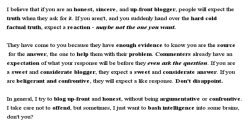
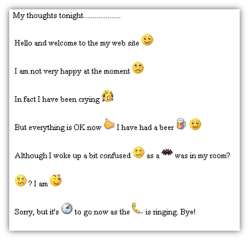
Point made.
?Ugly is as ugly does. Don?t clutter up your site with ugly link dumps.?
http://lorelle.wordpress.com is a link dump.
Link dumps are ugly and hard to read.
Lorelle on WordPress is the right way to create the link. It is easier to read, incorporates itself into the sentence, and looks cleans.
Converting a long link into a short link with a link shortener is popular today with sharing of links through social media. When included in post content, they are still ugly.
Learn how to link properly.
?If you aren?t using titles in links and alt in images, you are missing out on a very valuable use of keywords and content building. You are also not in compliance with web standards.?
Under the hood, a properly formed link looks like this:
<a href="http://example.com/" title="Article on Wedding Photography">wedding photography</a>
Note that the link is properly formed and features the title attribute, a description of what the destination link is about. This is required by US Federal Law and many international governments in accordance with web standards and accessibility laws.
The same applies to a properly formed image link, the link that makes an image appear on a website. It must have an alternative description and optional title.
<img src="http://example.com/smith-wedding.jpg" alt="Photograph of bride and groom in park." title="Smith Wedding Couple" />
The alternative description must describe the image in a complete sentence. The title attribute is the ?title? of the photograph.
Search engines use words, remember? Use every opportunity to get those words in your content, including on links and images. It benefits you with SEO and keeps your site in compliance with the law.
?Convince us to click to play. A picture may speak for itself, but you have to do the writing for it.?
You need the words. You need to convince us to take time out of our day to day life and stick you in our ears or eyes.
Describe what the audio, podcast, screencast, video, whatever multimedia you are using. Include show notes. Give us the words to make us click and pay attention.
?Comments are mini-resumes, for you and your commenter.?
One of my most popular articles is ?How NOT to Comment on Comments.? It?s list of recommendations on how to comment well includes saying something intelligent, asking something intelligent, writing something intelligent, and adding to the conversation.
It also was the first to describe a comment as a mini-resume. It?s true. When you comment on blogs, your name becomes a link to your website. Say something brilliant, people will follow that link through to your own site. They want to know more about you. Give them a good reason to check you out.
Comments are also content. You have the right to edit blog comments or delete them.
My rule of thumb is this. I think I have the best readers and commenters in the world. We all mistakes, so I will gladly clean up their mistakes in their comments to make both of us look good. If you say something totally off topic and stupid, I will delete it. If you stay something on topic and stupid, I might leave it as I believe comments speak loudly for themselves and their authors.
Whatever your rule of thumb, make sure you publish your comment policy among your policies. It helps to let everyone know the rules of your sandbox.
?The words you fill your blog with tend to last. Make sure the words you use and the things you say are worth reading twenty years from now.?
There is timely content and timeless content. I tend towards the latter.
I really respect personal blogs, the ones that rattle on about the day to day life we lead, their adventures, the normal acts of a life lived.
In 10,000 years when archaeologists of the future dig through the remains of our present, the little data bytes we leave behind will help them understand how we lived, why we did what we did, and what happened to us in the dust of the past.
I write for them as well as for you. Maybe you should, too.
?Even if you write badly, if you write with conviction and passion, then we will read you.?
Honestly, this has been proven time and time again. Social media, especially Facebook and Twitter, are prime examples. You don?t have to write like an award winning author. If you write with conviction, passion, and sincerity, even the grammar and punctuation police will forgive you.
- Content is synonymous with the subject.
- Links are synonymous with the subject.
- It builds a reputation.
- It builds authority.
- It becomes a destination.
- It becomes a source.
If you want to get someone?s attention,
show them something
they?ve never seen before,
or show them something in a way
they?ve never seen before.
If you write with passion and conviction, who cares how you write or how you tell your story.
Make it up as you go along.
It?s the telling that matters.
Like this:
Be the first to like this.
Source: http://lorelleteaches.wordpress.com/2012/10/14/what-you-must-know-about-writing-on-the-web/
mario batali lone ranger aaron brooks dave matthews band solar flares 2012 whitney houston will toyota recall
No comments:
Post a Comment
Note: Only a member of this blog may post a comment.